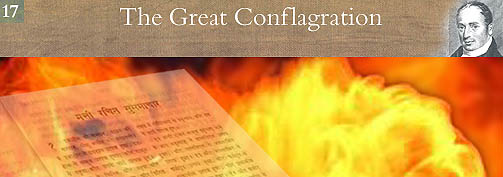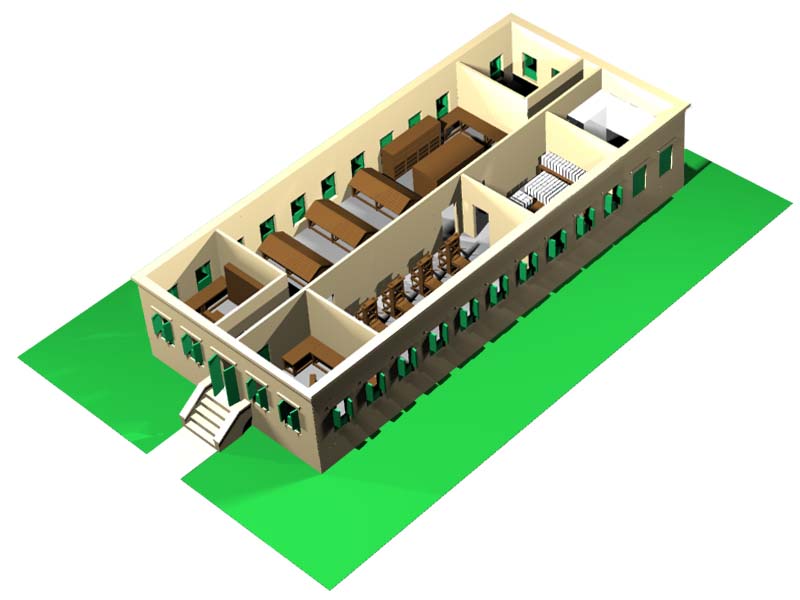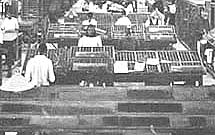

In a letter to Samuel Stennett dated 18th February 1811, Ward writes:
'We are in good health. I think I could not have enjoyed eleven years of better health in England. Our four dear children are just recovering from the measles, We have had more than twenty at once ill of them, lately, in our house and school. Our additions to the three churches at Calcutta, Jessore and Orissa, have been considerable. In Jessore alone, more than 30 natives have been baptized in 1810. Four new volumes of the Scriptures are just coming out of the press; two of them are in new languages, viz. the Mahratta and the Hindoost'hanee.
I was lately preaching from 'Rejoice, O young man, in thy youth, &c.' A notorious drunkard was impressed under the sermon, and he and his wife are proposed for baptism. This person's master had used every means in vain to persuade him to become sober; 'he got drunk' he said, ' because he had nothing else to do.' After this change, his master was urging him to to go to church, and not to the chapel: on which he said. 'You know, sir, what a drunkard I have been, and how often you have urged me in vain to leave it off; yet by going once to the chapel, I was constrained to do that, which none of your remonstrances were able to bring about; therefore it is that I wish to go again.' His master told him, he should have to get him a place in the mad house, if he went there.
I often enjoy Sabbath evenings at Calcutta amongst members. We drink tea, I read missionary and other letters, and we sing and pray. Sometimes we have not less than fifty friends thus sitting round a room conversing, singing and praying together; some of them, I hope, the fruits of my ministry. It is truly refreshing, after preaching three or four times, to have such an hour with dear friends.
An indication of the competitiveness of the Serampore Printing Office in 1811 In 1796, the Superintendent of the Government Press in Calcutta (where official papers were printed by contract) was in the habit of boasting that he would not exchange his post for that of a Member of Council who received £10,000 a year. The price of printing had been somewhat reduced since then through competition.
The cost of printing an edition of the Malayan Gospels in Bombay had cost £1,800. For double the number of copies, the entire New Testament could be produced by the Serampore Printing Office for £400.
The 3 senior missionaries regarded it the duty of a missionary to obtain as complete a knowledge as possible of the language, religious institutions, literature and philosophy of the people among whom he laboured, and to leave a record of these acquisitions, through the medium of the press, for the benefit of his successors. They therefore inculcated in every missionary the necessity of cultivating the literature of the country without relaxing their efforts to communicate the Gospel. By 1811, their contributions included the following:
Ward, amidst all his missionary labours, was still able to commit time to compiling his work on the history, literature and religion of the Hindus.
Marshman, while translating the Scriptures into Chinese, contributed the first translation of Confucius, and the first treatise on the structure of the Chinese language. In conjunction with Carey, they had produced 3volumes of the 'Ramayun'.
Carey had give the world grammars in Bengali, Sanskrit and Mahratti, and his grammars for Telugu and Punjabi were at the press. He had also made considerable progress on the Oriya grammar and his Bengali dictionary would spread to 3 volumes. He had also been collecting material for a Universal Dictionary of the oriental languages derived from Sanskrit, with the corresponding words in Greek and Hebrew, and a Mahratti dictionary.
These labours were not undertaken for literary distinction, but from a conscientious desire to accomplish the duties which they identified with their position as pioneers of the Mission.
Towards the end of 1811, and the beginning of 1812, the missionary circle was visited with the severest domestic afflictions. Carey lost his grandson; Robinson lost his wife and two children; Chamberlain lost all his children; and Chater and Marshman lost a child each. Ward lost 1 of his own children, Mary, an interesting little girl of about 6 years of age.
To this was added a deeper calamity which stopped their activities and tested their zeal and perseverance to the limit.
During the night of 11th March, 1812, the printing office was totally consumed by fire and the labour of 12 years destroyed in a few hours.
The office was about 100 feet in length, and 45 in breadth. At the entrance on the north were two rooms which Ward had used as a counting-house, and which contained all the papers and accounts of the Mission from its establishment. The southern rooms were filled with stores of paper and material; the intermediate space contained the cases and types, and a side room, more recently erected, the presses. The office was more extensively stocked than it had ever been. It contained 14 founts in the eastern languages, a large assortment of type recently received from England, and more than 1,200 reams of paper.

A speculative attempt to visualise the printing office based on John Clark Marshman's description. The building is described as 100 x 45 feet and the illustration has been drawn to scale. 
Early 20th century pictures of the Composing and Binding Departments at Baptist Mission Press, Calcutta, give an idea of what the interior of the printing office may have looked like.
The fire was discovered about 6pm in the evening at the southern end. The building was quickly filled with dense smoke, rendered the more suffocating because of the lowness of the roof. An attempt to stifle the flames was made by closing all the doors and windows, and the roof was opened at the seat of the fire in the hope of extinguishing it by pouring on water from above. (1)
After 4 hours had elapsed, these efforts appeared to give some hope of success, when an injudicious friend opened one of the windows with a view to saving some of the property. But the current of air thus introduced speedily set the building ablaze. The entire destruction of the office now seemed inevitable, and Ward hastened to rescue the deeds and records from the counting-house, in which he was partly successful.
By 11pm flames were bursting from every window, and at midnight the roof fell in with a crash. A steady column of flame rose into the night sky like a candle.
After the fire was complete, the members of the Mission family seated themselves in front of the scene of desolation, contemplating it with feelings of deep solemnity, but without a murmur, or a desponding look.
The value of the property destroyed was estimated at £7,000; but the loss of so many copies of the Scriptures, and of valuable manuscripts, far outweighed that of money. The manuscript of the translation of the 'Ramayan' was entirely destroyed, and work was never resumed. The materials for the Polyglot Dictionary, and the rough copy of the Telugu grammar, as well as all the versions in the Press, were destroyed. But the printing presses in the side room were happily preserved.
Early the next morning, Marshman travelled to Calcutta to inform Carey of the dismal news. He was so staggered by the blow that he was unable to speak a word for some time. They returned to Serampore in the evening and found, to their inexpressible delight, that Ward, who had been clearing the wreckage near the spot where the punches and matrixes had been had been stored, found them to be undamaged. If these invaluable items, which had been 10 years in preparation, had been destroyed by the fire, the labours of the missionaries would have been crippled for a long time.
On the discovery of the punches and matrixes every feeling of despondency vanished from Ward's mind as he considered the immediate renewal of their labours.
Ward writes to a friend on 26th March, 1812:
'I rejoice, that you have not forgotten me during so long an absence, and amidst so many changes. You have tasted the cup of affliction, yea, drank deeply of these bitter, though sanctifying waters, and you may now sympathise with your old friend; for he is beginning to sink in deep waters.
Mrs. Mardon, an old maid servant, one of the school boys, then my dear, dear child Mary, next brother Marshman's youngest, W Ward Marshman, and lastly the infant left by sister Mardon in the care of Mrs. Ward - all these deaths have happened in our family within a few weeks. Add to this, our large printing office, with all its contents, has been burnt down, by which we have sustained a loss of not less than 70,000 rupees, nearly 10,000 pounds, and all the editions of the Holy Scriptures are put a stop to for the present. We know not how the fire originated; (2) it began while I was sitting at one end of the printing office, at the close of the day, settling an account, when very few of the servants were left. I was almost suffocated when passing through the office soon after the fire began. The only things saved were our accounts and the writings of our premises.
Notwithstanding this loss by the fire is so great, I felt much more for the loss of my dear child, than for this; she was a charming child, and had entwined herself around my heart so much, that I seem never to have seen affliction till this child was taken from me. I had never calculated on the death of any of my family; but had always been thinking of being taken from them: this was often in my thoughts, and their situation after my death was not unfrequently a source of considerable anxiety. I have now two daughters left and Mrs. Ward's son by Mr. Fountain; he grows a big boy and is very obedient. I have many comforts left, and am very happy in my family; but I much wish to see the work of grace begun in the hearts of my children before I go hence.
I hope we shall start again printing the Scriptures in a few weeks.'
A building on the premises, near the river bank, more spacious than that which was consumed, had been rented to a mercantile firm in Calcutta for several years, and vacated by them only in the previous month. When the 3 missionaries met the next morning to discuss their future, they resolved to occupy it as their future Printing Office.
While the natives of the town despaired of the resumption of labour, the minds of the missionaries were filled with confidence. The workmen were called and paid up to the day, and dismissed to their homes for a month. Ward assured them, with a cheerful countenance, that the office would again be at work at the end of 30 days. The pundits were set to work translating, and the molten metal which had been collected to the extent of more than 4 tons, was made over to the typecasters. Their number was augmented and they worked night and day, with such diligence, that at the end of 30 days the missionaries were able to begin an edition each of the Tamil and Hindi New Testaments. Before the end of April, in less than 6 weeks from the night of the calamity, the Oriya, Sikh and Bengali founts had been completed, and within a few months, the Press was in full operation. All the work that was in progress at the time of the fire was commenced by the end of the year.
In writing to Fuller in 1813, Carey says that, at the end of 12 months, the office was in a more efficient state than it had ever been. The translations were superior to those that had been destroyed and the labour of executing them afresh was not greater than would have been entailed by the revision of the former manuscripts.
From men of every rank, and of every class, without distinction of creed or sect, the missionaries received the warmest expressions of sympathy, and the most generous offers of assistance. Throughout the community in India the calamity was considered a public one.
The efforts made in England to repair the loss present a gratifying example of Christian benevolence. The letter to Fuller announcing the loss arrived on 9th September, 1812. It was printed and widely circulated. When they heard of the loss, the church at Norwich collected £500, at Cambridge it was £165, and the Bible Society voted 2,000 reams of paper. The London Missionary Society donated £100, the editors of the 'Evangelical Magazine' £50, the church at Northampton £170, and that at Kettering added £160.
Subscriptions opened all over England. Fuller received between £600 and £700. London donated £1,000, Edinburgh £1,000, Leeds £300, Bradford £100, Bristol between £300 and £400, and Leicester between £200 and £300. The whole of the loss was made up in 60 days.
Within 2 months Fuller received sheets of the New Testament using the re-cast type. He cut them up and sent them to the places that had been so generous in their contributions. In a letter to the missionaries, Fuller said that the rapidity with which they had been enabled to repair the loss was as remarkable as if the pecuniary loss had been made up in a week. 'This fire has given your undertaking a celebrity which nothing else it seems could. Expect to be highly applauded, bitterly reproached, greatly moved, and much tried in every way, Oh, that having done all, you may stand!'
The missionaries had to sustain the re-establishment of the Printing Office from their own funds for 12 months until assistance arrived from England.
In March, 1813, Ward writes to Stennett:
'We are lifting up our heads again; our presses are more than ever employed, and we have one more press than we had last March, when the office was burnt down.'
The death of his dear child Mary affected him for a long time, even in 1814 he mentions her as if it had happened only recently. He is also concerned with the religious state of Ann:
'She is too thoughtful, I fear wholly so; she is sharp, and upon the whole affectionate, and I have great reason for thankfulness respecting my children; but every other anxiety is swallowed up in their eternal safety.'
When news of the disastrous fire was received at the Brook Street Baptist Church, Derby, Rev. Pike brought the matter before the Midland Conference, urging churches to make collections. He induced his Derby friends, though few in number, to undertake the entire support of one of the native preachers at Serampore. He endeavoured, by oral and written appeals, to excite a missionary spirit within the Churches of the General Baptists, and urged the formation of a General Baptist Missionary Society, either as an auxiliary of the existing Society or as a separate Society. With advice from Andrew Fuller, who considered the lack of unity between the Particular and the General Baptists was a problem, the latter option was decided upon. At the Annual Meeting of the Association at Boston, Lincolnshire, in 1816, Rev. Pike proposed the formation of a General Baptist Missionary Society of the New Connexion, and the vote was almost unanimously passed. Pike was elected the new Society's 1st Secretary, and issued a pamphlet on behalf of the Committee. The first Annual Meeting was held at Castle Donington on 24th June 1817. Although Pike was unable to become a missionary, Bampton, who with Peggs, became the first missionaries of the Society, had been educated by Pike in his own house.
(1) As editor of the 'Derby Mercury', Ward had frequently published articles by the Humane Society of London to educate readers in effective courses of action in emergencies. The articles were used as fillers, and to provide a valuable service to the community at a time when there were no emergency services. A perfect example is illustrated in the edition shown in Chapter One of this web site. The article details all the procedures, known at the time, for dealing with someone who appears to have drowned.
(2) As Ward says, the cause of the fire was not known, but, it is known that the typecaster's craft uses a furnace to melt metal. The moulten metal is then poured into matrixes, or type moulds, to create type. In a 'History of the Oxford University Press', volume 1, 1975, Harry Carter quotes a letter dated 1719, written by Thomas Hearne. A typefounder called Sylvester Andrews had been given a room in the Clarendon Printing House and Hearne writes: 'Last Night the New Printing House ... had like to have been burnt, occasion'd by the Letter Founder's Fire, whose room is above Stairs ...' Whether the typecasters at Serampore were housed within the Printing Office building is not known.